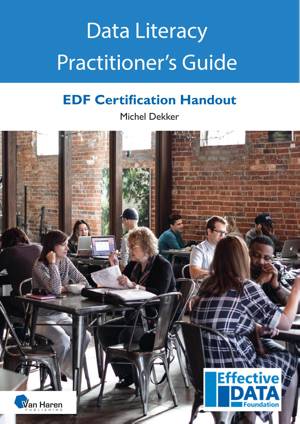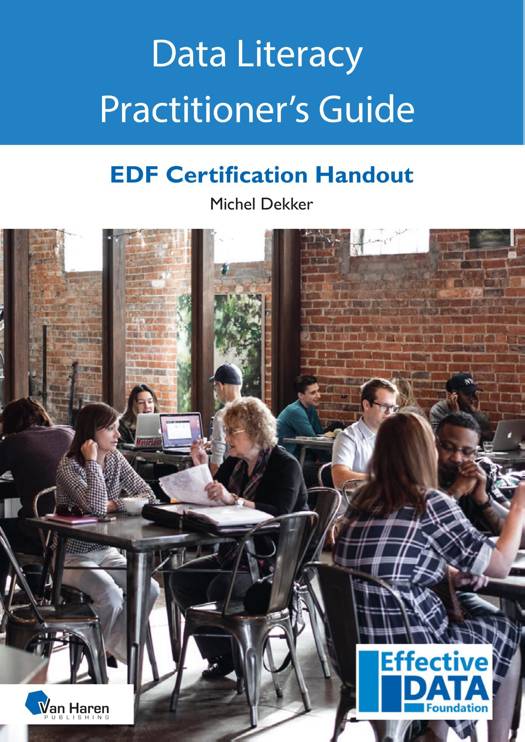
- Afhalen na 1 uur in een winkel met voorraad
- Gratis thuislevering in België vanaf € 30
- Ruim aanbod met 7 miljoen producten
- Afhalen na 1 uur in een winkel met voorraad
- Gratis thuislevering in België vanaf € 30
- Ruim aanbod met 7 miljoen producten
Zoeken
€ 27,20
+ 27 punten
Uitvoering
Omschrijving
"As kids, we learned our native language: reading, writing, and speaking. You learn a language by starting with grammar, trying it out, making mistakes and improving it.
We are flooded with facts and figures daily, but how well do we understand the meaning behind all those numbers? How can we turn this data into value in our day-to-day work and for the organization we work for? The ability to derive meaningful information from data is called Data Literacy. Making sense of data is no longer just a skill for data scientists and technology experts but an essential skill for all of us.
Data Literacy is the ability to read, work with, analyze and argue with data.
This course is the first step to make you aware of Data Literacy (as an essential skill) and how it impacts your work. You'll learn the fundamentals and how they relate to working in a data-informed organization. This will be enough for some people to raise the required questions when confronted with data. For others, this is the first step in becoming a fluent data speaker.
This Data Literacy Practitioner's Guide consist of four modules, each with its own weight towards the EDF Data Literacy Professional certification exam:
Weight Topic
Introduction Introduction to Data Literacy
Read data 25% The ability to read and interpret data correctly. Which questions we need to ask to avoid fooling ourselves.
Work with data 25% What happens to data during its journey from the source to final consumption? How does this impact the understanding and possibilities of this data?
Analyze data 25% Data needs to be analyzed, not only read. In this section we'll have a closer look at how we analyze data.
Argue with data 25% Once we have found interesting insights in the data, we need to share this with our audience. In this part we'll look at what we need to do so our audience understands the data in the best possible way."
We are flooded with facts and figures daily, but how well do we understand the meaning behind all those numbers? How can we turn this data into value in our day-to-day work and for the organization we work for? The ability to derive meaningful information from data is called Data Literacy. Making sense of data is no longer just a skill for data scientists and technology experts but an essential skill for all of us.
Data Literacy is the ability to read, work with, analyze and argue with data.
This course is the first step to make you aware of Data Literacy (as an essential skill) and how it impacts your work. You'll learn the fundamentals and how they relate to working in a data-informed organization. This will be enough for some people to raise the required questions when confronted with data. For others, this is the first step in becoming a fluent data speaker.
This Data Literacy Practitioner's Guide consist of four modules, each with its own weight towards the EDF Data Literacy Professional certification exam:
Weight Topic
Introduction Introduction to Data Literacy
Read data 25% The ability to read and interpret data correctly. Which questions we need to ask to avoid fooling ourselves.
Work with data 25% What happens to data during its journey from the source to final consumption? How does this impact the understanding and possibilities of this data?
Analyze data 25% Data needs to be analyzed, not only read. In this section we'll have a closer look at how we analyze data.
Argue with data 25% Once we have found interesting insights in the data, we need to share this with our audience. In this part we'll look at what we need to do so our audience understands the data in the best possible way."
Specificaties
Betrokkenen
- Auteur(s):
- Uitgeverij:
Inhoud
- Aantal bladzijden:
- 73
- Taal:
- Engels
- Reeks:
Eigenschappen
- Productcode (EAN):
- 9789401811323
- Verschijningsdatum:
- 6/03/2024
- Uitvoering:
- E-book
- Beveiligd met:
- Adobe DRM
- Formaat:

Alleen bij Standaard Boekhandel
+ 27 punten op je klantenkaart van Standaard Boekhandel
Beoordelingen
We publiceren alleen reviews die voldoen aan de voorwaarden voor reviews. Bekijk onze voorwaarden voor reviews.











